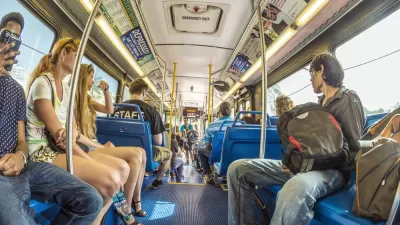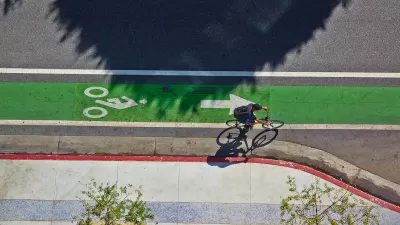L.A. has a plan for improving mobility. Why are city leaders ignoring it?

In an Los Angeles Times op-ed, Streets for All founder Michael Schneider writes that Los Angeles City Council members are "actively ignoring" the goals and actions laid out in the city's mobility plan that would encourage multi-modal transportation and reduce carbon emissions. The councilmembers' "persistent hostility toward the bike and bus lanes envisioned by that plan," Schneider says, affects all L.A. residents, not just those who use public transit or bicycles. By encouraging more sustainable forms of transit, city leaders could improve air quality and reduce congestion, benefiting everyone.
With nearly year-round perfect weather, a relatively flat city and an average trip of three miles, L.A. could get tens of thousands of cars off the road quickly, just by implementing its own plan and building the right infrastructure for car alternatives.
Today, bike lanes are installed in small, disconnected segments, often dumping riders onto busy streets with no protection. With cars accounting for 28 percent of greenhouse gas emissions in California, Schneider argues that local politicians should stop kowtowing to constituents who don't want to give up their cars and work to implement the recommendations in the mobility plan. Schneider advocates for citywide policy and implementation that would create a comprehensive and useful transportation network for cyclists and transit riders and help the city take concrete steps toward its climate goals.
FULL STORY: Op-Ed: L.A. can no longer afford to push bikes and buses aside

Study: Maui’s Plan to Convert Vacation Rentals to Long-Term Housing Could Cause Nearly $1 Billion Economic Loss
The plan would reduce visitor accommodation by 25,% resulting in 1,900 jobs lost.

Alabama: Trump Terminates Settlements for Black Communities Harmed By Raw Sewage
Trump deemed the landmark civil rights agreement “illegal DEI and environmental justice policy.”

North Texas Transit Leaders Tout Benefits of TOD for Growing Region
At a summit focused on transit-oriented development, policymakers discussed how North Texas’ expanded light rail system can serve as a tool for economic growth.

Comment: EPA Cuts will Send Atlanta Back to Eye-burning Ozone, Lung-damaging Smog, and Raw Sewage in the Chattahoochee River
A veteran political journalist takes stock of the hard-earned ground Georgia stands to lose with slashed environmental protection.

How Community Science Connects People, Parks, and Biodiversity
Community science engages people of all backgrounds in documenting local biodiversity, strengthening connections to nature, and contributing to global efforts like the City Nature Challenge to build a more inclusive and resilient future.

Alabama: Trump Terminates Settlements for Black Communities Harmed By Raw Sewage
Trump deemed the landmark civil rights agreement “illegal DEI and environmental justice policy.”
Urban Design for Planners 1: Software Tools
This six-course series explores essential urban design concepts using open source software and equips planners with the tools they need to participate fully in the urban design process.
Planning for Universal Design
Learn the tools for implementing Universal Design in planning regulations.
City of Santa Clarita
Ascent Environmental
Institute for Housing and Urban Development Studies (IHS)
City of Grandview
Harvard GSD Executive Education
Toledo-Lucas County Plan Commissions
Salt Lake City
NYU Wagner Graduate School of Public Service




























